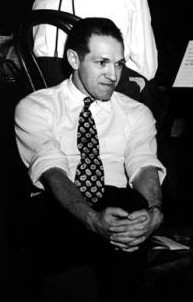
Eli Oberstein
1901-1960 US, New York City
Producer
A.k.a. Elliott Everett Oberstein Elliot Everett
b. 13 December 1901 d. 12 June 1960 American record producer and music industry executive, whose career spanned the late 1920s - 1950s. He is best remembered as a major force behind the success of the Bluebird (3) label. He later owned a succession of small labels. He may be the most controversial producer of the first 50 years of the record industry, having earned an unsavory reputation through business conduct that was often unethical and perhaps illegal. Oberstein started in the music industry around 1925, first as an employee of the Starr Piano Company and then as treasurer at Okeh. His mentor, Ralph Peer, then hired him to work at Victor Talking Machine Co. in 1929. Originally a salesman and accountant, Oberstein rose rapidly through the ranks at Victor. By 1931 he was supervising recording sessions and by 1932 he was assigned to manage RCA pressing for the Crown Record Company. He positioned himself within the RCA-Victor establishment to head the budget-labels, including Timely Tunes and eventually Bluebird. Peer had taught Oberstein to personally hold artist-management contracts with performers he signed for RCA. He developed the race and country-music catalogs, and was responsible for making Bluebird a major pop label. During the 1930s, Oberstein signed Artie Shaw, Charlie Barnet, Glenn Miller and many other rising stars. Oberstein also had a devious side, and undermined associates, including his mentor Ralph Peer, in order to gain full control of Bluebird. His controlling nature was also evident when he took over conducting duties for well-known band leaders at many sessions. He created the pseudonym "Elliot Everett And His Orchestra" and sometimes substituted it for the names of the actual performers on records. Oberstein was fired (or resigned) from RCA in February, 1939 and sought to become an independent record producer. He established the United States Record Corporation and launched the Varsity and Royale labels in the summer of 1939, and attempted to force Bluebird artists (whose personal management contracts he held) to defect to his new labels. However, artists either bought out their contracts or contested and prevailed, and the mass defection never happened. Oberstein's new labels failed in a little over one year. During their brief existence, Oberstein was frequently at the center of controversies over finances, artist (mis)treatment and questions concerning the sources of his masters. Many of these had been dubbed from old Crown (5), Gennett Records and Paramount recordings and issued under pseudonyms on Oberstein's labels. After the United States Record Corporation went bankrupt, Oberstein set up the Imperial Record Company and launched the Elite (3) label. By the end of 1941 he had merged with Classic Record Company, producers of the Concertone label. During 1942, he was pressing large quantities of his fledgling Elite (3) label, despite wartime shellac shortages. He claimed these were pressed on shellac salvaged from a freighter that had been torpedoed in the Atlantic. He circumvented the 1942-43 Petrillo recording ban by claiming that his recordings were made in Mexico. However, rumors circulating at the time alleged that he was holding recording sessions in New York hotel rooms using amateur talent and professional musicians willing to ignore the ban. To further his estrangement from record industry leaders, Oberstein produced risqué party records and pressed dubbed pseudonymous reissues of decade-old material to which he probably did not own rights. Consequently, he was expelled from the AFM in 1942 and not reinstated until November, 1943, when he agreed to abide by the AFM's terms. Oberstein returned to RCA in 1945 to resume his position as director of A & R for Bluebird. His old ambition was lacking, however, and he left again in 1948 to re-launch his Varsity and Royale labels under a new company Wright Record Corporation, first based in New York and later in Meriden, Connecticut. By 1950 he had consolidated many smaller companies, including the Rondo (2) label, into a new entity, the Record Corporation Of America, which Oberstein often referred to publicly as "RCA". By the late 1950s, he had sold many of his interests to Pickwick Sales Corp. He died in 1960 at the age of 58.
